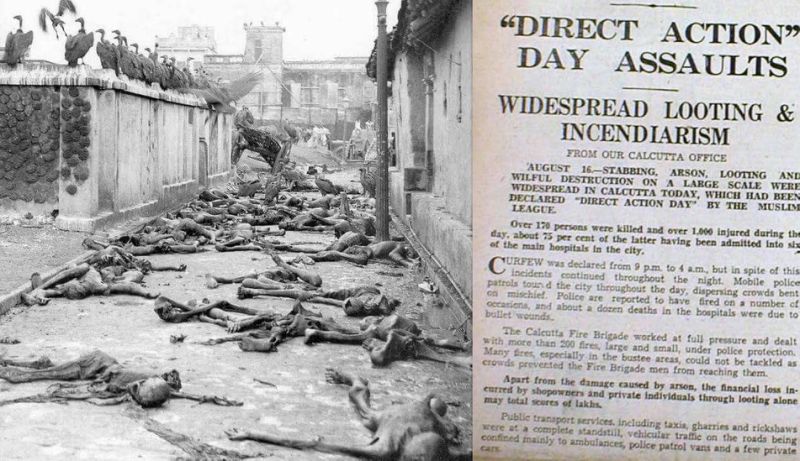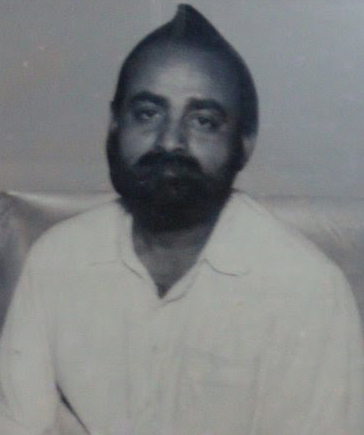Kolkata (earlier Calcutta) has been an important major city for many centuries, it was even the capital of India during British Raj and remain one till 1911. However, very few people are aware that Calcutta could become part of West Pakistan during the partition. However, few brave Hindus thwarted the nefarious plans of the Muslim League, which we will cover in this article.
Before the partition, India was witnessing a vicious environment due to Muslim League’s ongoing Pakistan movement, and they were planning to assimilate as much area as possible in proposed Pakistan. Jinnah was determined to add the whole of Punjab and Bengal in Pakistan. However, a brave Hindu Gopal Patha put a spanner in the works of Jinnah and the Muslim League, and he single-handedly thwarted the plans of Muslims and not only save Calcutta from the clutches of Jihadis but also ensured the safety of millions of Hindus.
Muslim League’s nefarious plan for Bengal
Bengal’s eastern part had a majority of the Muslim population, but this area was industrially backward, as most of the factories were based in Calcutta and its nearby areas. That area was Hindu-dominated and people from neighboring areas like Odisha and Bihar used to work in these factories.
Jinnah and Muslim League understood the importance of this area and they knew that if Pakistan had to become a powerful nation, it could not have done so without assimilating these industries. It was decided to make these areas Muslim majority by calling a ‘direct action day’.
The provincial assembly elections of Bengal organized in January of 1946. Out of 119 Muslim seats, the Muslim League won whopping 95% seats i.e. 113, and it emerged as the biggest party in Bengal. Its leader Huseyn Shaheed Suhrawardy became the Prime Minister of Bengal. As PM, Suhrawardy had complete control over Police and Administration.
Jinnah declared the 16th of August, 1946 to be “Direct Action Day”, to show the power of its “Direct Action”. Suharawardy declared that the 16th of August would be the day of complete hartal and even declared a public holiday to further ensure the success of the plan. The Hindus did not like it as they were forced to keep the shops closed in support of the Muslim League.
However, Muslim League and Jinnah have decided to create mayhem in the name of religion, they stoked the religious sentiments of Muslims in the name of Islam. It was the month of Ramzan and the wars of early Muslims against non-Muslims were used to draw a parallel with prevalent conditions. The 13 August 1946 issue of Muslim League mouthpiece The Star of India, said “Muslims must remember that … it was in Ramazan that the permission for jehad was granted by Allah. It was in Ramazan that the Battle of Badr, the first open conflict between Islam and Heathenism, was fought and won by 313 Muslims and again it was in Ramazan that 10,000 Muslims under the Holy Prophet conquered Mecca and established the kingdom of Heaven and the commonwealth of Islam in Arabia. The Muslim League is fortunate that it is starting its action in this holy month.”
The plan was to re-enact the Battle of Badr, which has taken place on the 18th of Ramzan. Syed Muhammad Usman, the then-mayor of Calcutta, published a leaflet that said: Kafer! Toder dhongsher aar deri nei! Sarbik hotyakando ghotbei! (Hindus! Your destruction is not far away! You will be massacred!).
What happened on Direct Action Day?
The violence erupted even before 16th August, and several incidents of manhandling, killing, and loot against Hindus were reported. On 16th August Muslims gathered at Ochterlony Monument to hear their leader Suhrawardy. That was a massive gathering and as per few sources, several lakh of Muslims joined that rally. Suhrawardy declared that he will not let police and military interfere and ensure a free hand will be given to the Muslim mob.

This was an open invitation to riot without any fear of police action and any sort of legal action. Several other Muslim clerics also gave fiery speeches against Hindus, which encouraged the Muslims to orchestrate the riots and killing of Hindus in the name of Islam.
The riots started immediately after the meeting was over. Muslims returning from the meeting killed Hindu shop owners who had kept the shops open, burnt properties of Hindus, and started a reign of terror in Calcutta. The worst killings happened on the 17th of August when thousands of Hindus were massacred and their properties worth several Crores were demolished or looted.
This mayhem may continue and millions of Hindu may have killed, but a brave warrior came and ensured no further losses to Hindus and countered this evil Direct Action Day, and that person was Gopal Patha.
Who was Gopal Patha?
His complete name was Gopal Chandra Mukhopadhyaya and he was born in a Bengali Hindu family of Malanga Lane in the Bowbazar of Kolkata.

He was the nephew of revolutionary Anukul Chandra Mukhopadhyaya. He earned the nickname ‘Patha’ (goat in Bengali) because his family used to run a renowned meat shop. When he grew up, he took the responsibility for running the meat shop. As a part of his business, he had to regularly interact with Muslim traders.
How Gopal Patha thwarted the Direct Action Day and saved Millions of Hindu lives
Gopal Patha was an ardent follower of Netaji Subhash Chandra Bose, he established an organization named Bharat Jatiya Bahini (Bhartiya People’s Army), which included many Hindu wrestlers, who had trained in akharas. The total strength of this organization was around 500-800.
Patha was seething in anger when he witnessed the killings by Muslims, and the inaction of the police, he gathered the members of his Bharat Jatiya Bahini and instructed them to fight fire by fire and brutality with brutality.
Gopal Patha understood the fact that this was a very critical time for the country, and if nothing is done then the whole area will become Pakistan, which will result in the killing of millions of Hindus and further and repression. He called all his boys and told them that this is the time to retaliate. Hindus must kill 10 Muslims if they kill 1 Hindu.
He had procured some pistols, cartridges, and grenades from the American soldiers stationed in Calcutta after the second World War. He chalked out a robust and detailed plan to retaliate. He even collaborated with the Marwaris traders of Burrabazar to get financial backing. Several Hindu blacksmiths produced knives, swords, spears, and other weapons in huge quantities. Gopal was instrumental in bringing migrant people like milkmen, vegetable sellers, laborers, and others to join this movement.
Gopal Patha asked his men to start the counterattack on the 18th of August. Suhrawardy gave a free hand to his jihadis for 2 more days and his sole objective was to make Calcutta a Muslim majority city. However, they had no idea about the plans of Hindu retaliation.
Hindus under the able leadership of Patha started killing the Muslim League goons and gradually they started attacking the Muslim majority areas. Gopal’s group created havoc for Muslim National Guard ( a Jihadi militia associated with the Muslim League) and killed thousands of their members, however, no women or children were harmed.
Over the next three days, Gopal Patha and other Hindu leaders identified, hunted and killed people who had taken part in killings of Hindus. Some other leaders involved were Jugal Chandra Ghosh who ran an akhara and Basanta, a famous wrestler. All of them were also connected to Marwari traders and Hindu Mahasabha and Congress leaders. Majority of the muscle was provided by Bengali Dalits as well as non-Bengali migrant population with people from UP, Bihar and Odisha.
This counter action led to a massive panic amongst the ranks of Muslim League and Jinnah. By 20th August the death toll of Muslims had surpassed that of Hindus. Suhrawardy got a shock of his lifetime, when he visited Lalbazar area, which witnessed massive killings of Muslims.
To save himself and his government, Suhrawardy deputed G G Ajmiri and Sheikh Muzib Ur Rehman to request a truce with Patha. G.G.Ajmiri was the leader of the student’s wing of the Muslim League and Mujibur Rahman was a member of the Muslim National Guard. They went to Gopal Patha and requested an end to the killings. Patha agreed on the condition that the Muslim League would stop attacks on Hindus first.
Suhrawardy had no option left and had to accept all the conditions of Gopal Patha. On 21st August, the British dismissed the Suhrawardy govt and the British Army flag marched in riot impacted areas and pacified the situation.
The Calcutta Killings spread to other areas of Bengal and Bharat. Indeed, until after the partition, the riots continued. So, Gopal Patha retained his organization as a shield for Hindus against Muslims. In 1947, Mahatma Gandhi was touring Bengal to stop the riots. Several Hindu leaders surrendered their arms, but Gopal Patha dismissed the suggestions of Gandhi.
He said that “Gandhi called me twice, I didn’t go. The third time, some local Congress leaders told me that I should at least deposit some of my arms. I went there. I saw people coming and depositing weapons which were of no use to anyone: out-of-order pistols, that sort of thing. Then Gandhi’s secretary said to me: ‘Gopal, why don’t you surrender your arms to Gandhiji?’ I replied, `With these arms, I saved the women of my area, I saved the people. I will not surrender them. Where was Gandhiji, I said, during the Great Calcutta Killing? Where was he then? Even if I’ve used a nail to kill someone, I won’t surrender even that nail.” Gandhi could not win over Patha.
Patha – the Forgotten Savior of Hindus
No wonder, in the Nation which is high on pseudo-secularism and Gandhian principles, Gopal Patha was easily buried and forgotten in the annals of history. Even today, people don’t remember him, they don’t understand the importance of Gopal Patha, how he saved millions of Hindus by his timely act.
He died in 2005, however, few Bengalis like Tapan Ghose and his Hindu Samhati started celebrating his actions and spread the word about his heroics. We must share his story with our generation, to make them aware of the unsung hero Gopal Patha, who has such a massive contribution towards the welfare of Hindus and India.

